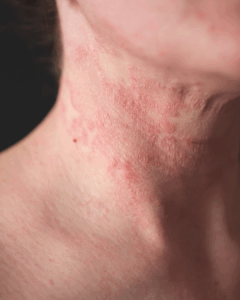Eczema, or atopic dermatitis, is a chronic skin condition that affects millions of people worldwide. It causes dry, itchy, and inflamed skin, often leading to discomfort and frustration.
While eczema can appear at any age, it commonly begins in childhood and may continue into adulthood. Understanding the triggers and treatment options is key to managing flare-ups and protecting your skin.

What Causes Eczema?
Eczema develops from a combination of genetics, environmental factors, and an overactive immune response. Common triggers include:
- Harsh skincare products or soaps
- Allergens and seasonal changes
- Stress and lack of sleep
- Heat, sweat, or irritating fabrics (like wool)
When the skin’s natural barrier is weakened, it loses moisture and becomes more sensitive to irritation, leading to redness and itching.
Common Symptoms of Eczema
Eczema symptoms can vary from person to person but often include:
- Dry, flaky patches of skin
- Intense itching, especially at night
- Red or swollen areas
- Cracked or blistering skin during severe flare-ups
Scratching can make symptoms worse and increase the risk of infection, making early treatment essential.
How to Treat and Manage Eczema
There is no cure for eczema, but with the right skincare routine and lifestyle changes, you can significantly reduce flare-ups.
Effective management tips:
- Moisturize daily with fragrance-free creams or ointments
- Use gentle cleansers instead of harsh soaps
- Avoid known triggers like fragrances or allergens
- Apply topical treatments such as corticosteroid creams (as prescribed)
- Wear soft, breathable fabrics like cotton
When to See a Dermatologist
If over-the-counter treatments aren’t providing relief, a dermatologist can recommend advanced therapies, prescription creams, or allergy testing to help manage chronic eczema.
Living with eczema can be challenging, but relief is possible with the right care routine. By understanding your triggers and treating symptoms early, you can maintain calmer, healthier skin.
